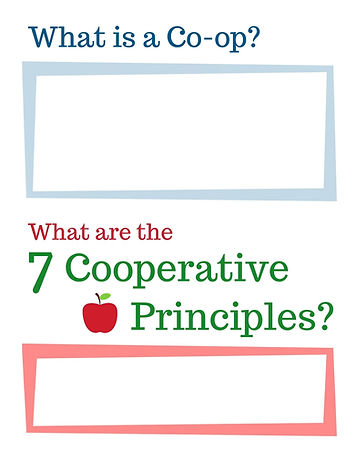
HOW CO-OPS WORK
What is a Co-op?
A cooperative is simply a type of business model. From the outside, most co-ops don’t look that different from any other corporation, it’s how they’re run that the difference is found. Instead of being run by a single owner, a co-op is owned by its membership. This can come in a variety of forms and can be found in nearly any business sector including Grocery, Agriculture, Utilities, Housing, Healthcare, Insurance, and Education.

Our Board of Directors hard at work at their monthly meeting.
Worker co-ops: Worker cooperatives are owned by the people who work for the company. Workers contribute to the co-operative through their labor and the work they do for the organization. Decisions about the vision of the business are made by the workers. Examples in the Upper Valley are Cedar Circle Farm and King Arthur Flour.
Producer co-ops: Producer cooperatives are owned by the producers of products who have joined together to market their products better or to streamline the production process. Agriculture cooperatives such as Blue Diamond or Land O’Lakes are examples of producer cooperatives.
Consumer co-ops: Consumer co-ops are owned by the customers who then purchase goods and services from the cooperative. This includes grocery co-ops like the Upper Valley Food Co-op!
Purchasing co-ops: Purchasing co-ops are typically made up of several small businesses who have joined together to improve their purchase power and to get better discounts and offers on products and services.
Hybrid co-ops: A hybrid cooperative is a combination of any of the four other types of co-op.
What’s the benefit of a co-op?
The purpose of a cooperative is to realize the economic, cultural and social needs of the organization’s members and its surrounding community. Cooperatives often have a strong commitment to their community and a focus on strengthening the community they exist in or serve. When a co-operative does well financially or economically, the community served by the co-op benefits, not just a small group of shareholders.
Cooperatives of every form and industry are guided by the same 7 Principles:

A cooperative is an autonomous association of persons united voluntarily to meet their common economic, social, and cultural needs and aspirations through a jointly-owned and democratically-controlled enterprise.
The cooperative principles are guidelines by which cooperatives put their values into practice.

Open to all, without gender, social, racial, political, or religious discrimination.
You may shop, you may join, and you may leave the co-op at any time.

One Owner, one vote.
Your voice will be heard.

Owners contribute equitably to, and democratically control, the capital of the cooperative. The economic benefits of a cooperative operation are returned to the Owners, reinvested in the co-op, or used to provide Owner services. You control the capital.

Cooperatives are autonomous, self-help organizations controlled by their Owners. Together, you are autonomous.

Cooperatives provide education and training for Owners so they can contribute effectively to the development of their cooperatives. They inform the general public about the nature and benefits of cooperation. You can develop yourself into the consumer you want to be.

Cooperatives serve their Owners most effectively and strengthen the cooperative movement by working together through local, regional, national and international structures. You are more successful when you cooperate with others who know how to cooperate.

While focusing on Owner needs, cooperatives work for the sustainable development of their communities through policies accepted by their Owners. You can do something for the community even as you keep succeeding.
